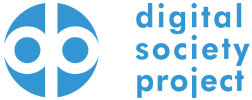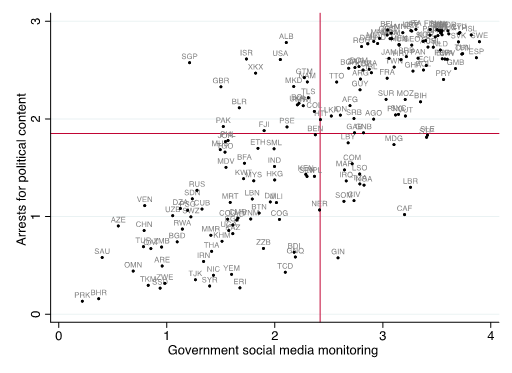The above graph presents a scatterplot of two indicators: arrests for political content and government social media monitoring. We detail the scale at the bottom of this page, but in short, a higher rating is nominally better, while a lower rating is nominally worse. That is, a high score here means less arrests on the first indicator, and less monitoring on the second indicator.
We see that these two indicators are highly correlated, and countries that are relatively democratic on both dimensions cluster at the upper-right corner of the figure. Similarly, if governments closely monitor social media, they are quite likely to follow-up on the information they find, and arrest citizens. It is quite worrying that in 37% of the countries if a citizen posts political content online that would run counter to the government and its policies, they would be likely or highly likely to get arrested. One example is Zambia, which has cracked down on social media freedom. In a prominent case in the beginning of 2018, an individual was given a sentence of seven years for defaming language of the Zambian president on Facebook (Freedom House 2019).
The detailed breakdown of the indicator’s text and what the ratings correspond to follows below.
Government Social Media Monitoring asks how comprehensive is the surveillance of political content in social media by the government or its agents? Ratings are on a scale of:
0: Extremely comprehensive. The government surveils virtually all content on social media.
1: Mostly comprehensive. The government surveils most content on social media, with comprehensive monitoring of most key political issues.
2: Somewhat comprehensive. The government does not universally surveil social media but can be expected to surveil key political issues about half the time.
3: Limited. The government only surveils political content on social media on a limited basis.
4: Not at all, or almost not at all. The government does not surveil political content on social media, with the exceptions mentioned in the clarifications section.
Arrests for Political Content asks the question: if a citizen posts political content online that would run counter to the government and its policies, what is the likelihood that citizen is arrested? Ratings are on a scale of:
0: Extremely likely.
1: Likely.
2: Unlikely.
3: Extremely unlikely.

